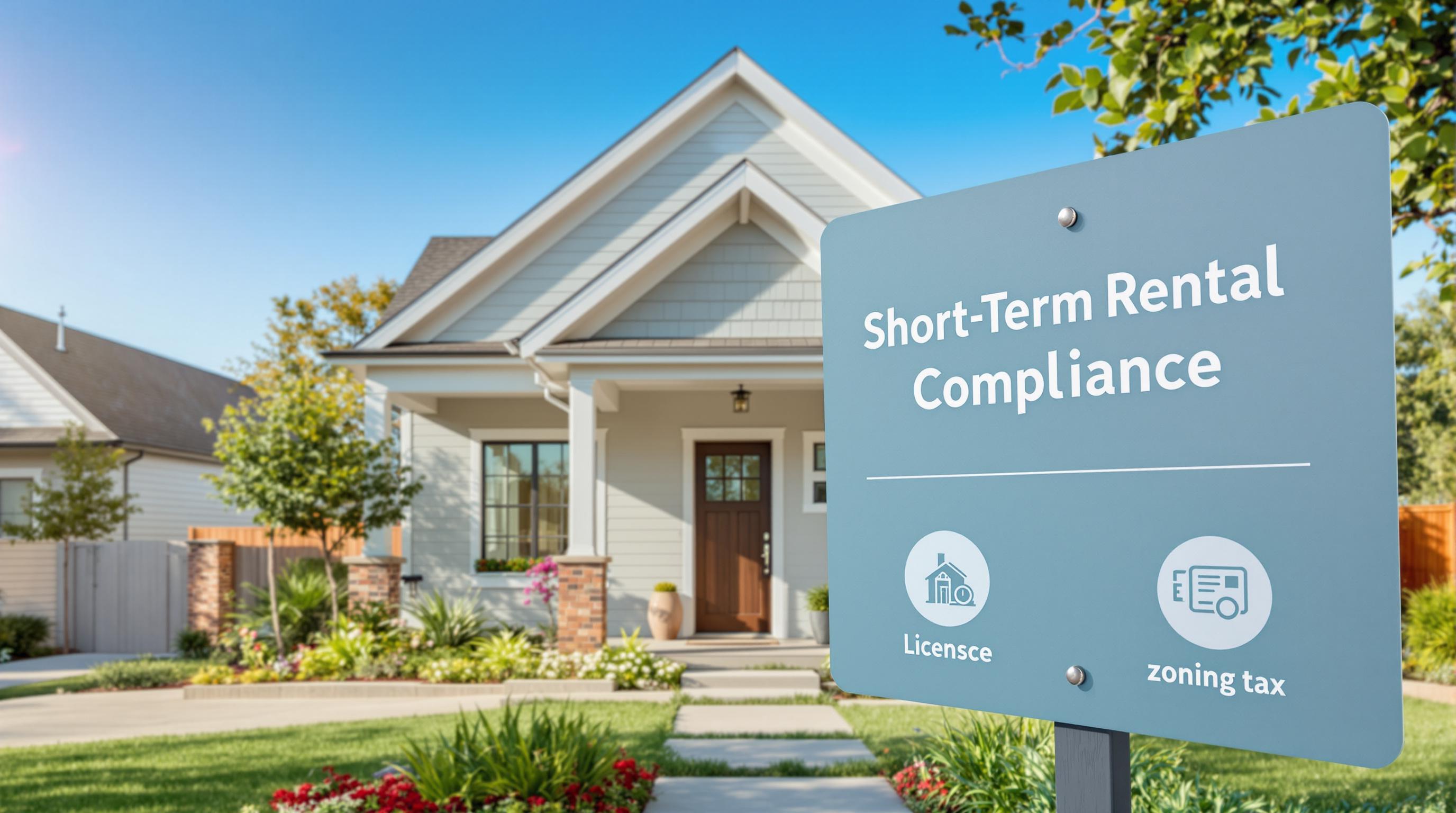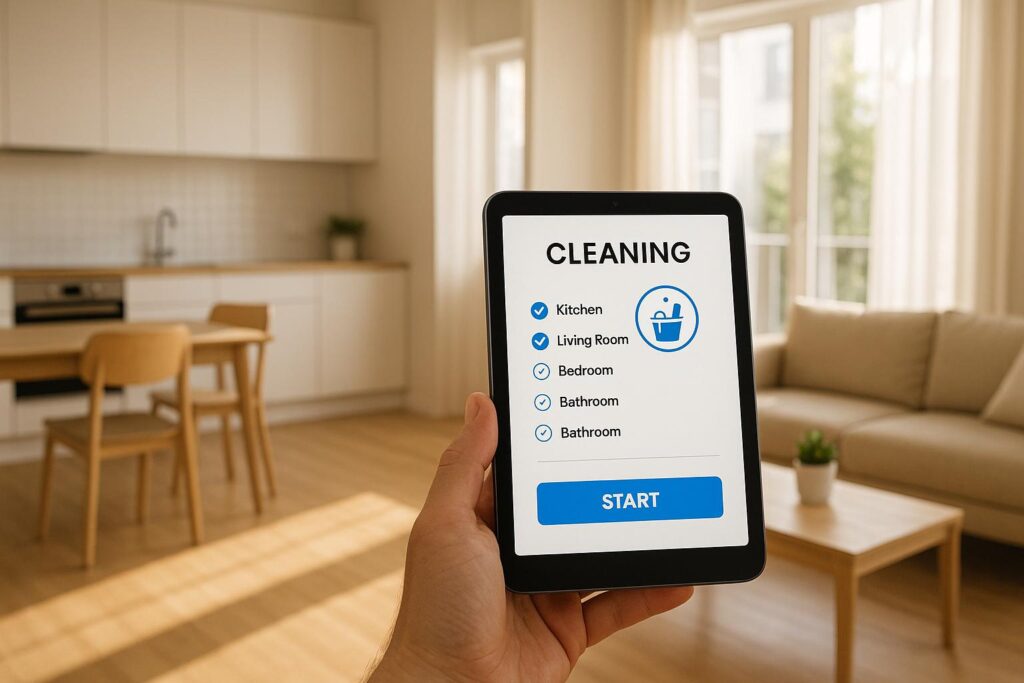Planning to operate a short-term rental (STR) in Austin? Here’s a quick guide to staying compliant with city regulations:
- Get Licensed: Submit property details, pass a safety inspection, carry $1M liability insurance, and pay a $443 license fee ($235 annual renewal).
- Follow Zoning Rules:
- Type 1: Owner-occupied homes allowed in all residential zones.
- Type 2: Non-owner-occupied homes restricted to commercial/mixed-use zones.
- Type 3: Multi-family units limited to 3% per complex.
- Meet Guest Rules: Max 6 unrelated adults or 10 related individuals per unit, quiet hours (10 PM–7 AM), and at least one off-street parking space.
- Pay Taxes: 6% state + 9% local hotel occupancy taxes, reported quarterly.
- Stay Educated: Use free online modules, workshops, and guides for compliance tips.
Quick Overview:
| Requirement | Details |
|---|---|
| License Fee | $443 initial, $235 annual renewal |
| Insurance | $1,000,000 liability coverage |
| Zoning | Varies by STR type (owner-occupied, etc.) |
| Occupancy Limits | 6 unrelated adults or 10 related guests |
| Taxes | 15% total (state + local) |
| Quiet Hours | 10 PM–7 AM |
Stay compliant by keeping licenses updated, following zoning rules, and using Austin’s education programs.
STR Licensing in Austin
Austin STR Rules and Requirements
If you’re planning to operate a short-term rental (STR) in Austin, you’ll need to follow specific licensing, zoning, and operational rules. Here’s what you need to know to stay compliant.
Getting an STR License
To legally run an STR in Austin, owners must:
- Submit property details and floor plans
- Pass a safety inspection covering smoke alarms, exits, and structural soundness
- Carry liability insurance with a minimum coverage of $1,000,000
- Pay an initial license fee of $443
Annual license renewals cost $235. During renewal, owners must update contact information and report any ownership changes.
Location and Zoning Rules
Austin divides STRs into three categories:
| STR Type | Description | Location Rules |
|---|---|---|
| Type 1 | Owner-occupied primary residence | Allowed in all residential zones |
| Type 2 | Non-owner-occupied single-family homes | Restricted to commercial and mixed-use zones |
| Type 3 | Multi-family units | Limited to 3% of units per complex |
More STRs are permitted in commercial and downtown areas, while residential zones have stricter limits to maintain neighborhood character.
Guest Limits and Tax Requirements
STR operators must also meet these operational guidelines:
- Occupancy Limits: No more than 6 unrelated adults or 10 related individuals per unit
- Quiet Hours: Enforced from 10:00 PM to 7:00 AM
- Parking: At least one off-street parking space per unit
- Taxes:
- 6% state hotel occupancy tax
- 9% local hotel occupancy tax
- Taxes must be reported quarterly
Additionally, owners must maintain guest records, provide local contact information available 24/7, and ensure regular maintenance and safety checks to keep their license active.
STR Education Programs
Austin provides educational resources and outreach efforts to help short-term rental (STR) operators navigate the city’s regulations effectively.
Training and Resources
The Austin Development Services department offers several tools to support STR compliance:
- Online Learning Portal: Available on the city’s website, this portal includes interactive modules covering licensing, safety requirements, and tax obligations.
- Monthly Workshops: Held at City Hall every third Thursday from 2:00 PM to 4:00 PM, these sessions provide in-person guidance.
- Compliance Guides: Downloadable handbooks (available in English and Spanish) cover topics such as:
- Applying for and renewing STR licenses
- Preparing properties for inspections
- Best practices for guest management
- Tax reporting processes
Additionally, a dedicated STR help desk operates Monday through Friday, 8:00 AM to 5:00 PM, offering personalized assistance with compliance questions.
| Type | Format | Frequency | Cost |
|---|---|---|---|
| Online Modules | Digital | Ongoing | Free |
| Workshops | Group training | Monthly | Free |
| Consultations | Virtual/In-person | By appointment | $75/hour |
| Handbook | Digital/Print | Quarterly | Free |
Public Information Campaigns
Austin also engages the broader community through targeted outreach initiatives.
Neighborhood Association Partnerships
The city collaborates with local neighborhood groups to share updates on STR regulations and reporting procedures. These efforts include quarterly newsletters and presentations at community meetings.
Digital Communication Channels
- Weekly updates on Facebook and Twitter
- Monthly email newsletters for licensed operators
- Regular updates to the STR information portal
- Mobile app notifications for registered users
Community Events
The annual Austin Housing Expo and quarterly real estate association meetings serve as key venues for sharing STR compliance information.
To ensure accurate and timely updates, the city also works with local property management companies and real estate organizations to communicate with current and prospective STR operators.
sbb-itb-4c99469
Rules Enforcement and Fines
Austin’s Code Department ensures compliance with short-term rental (STR) regulations through inspections and by addressing community complaints.
Property Inspections
The department carries out property inspections both during the licensing process and after receiving reports from residents. These inspections play a key role in holding property owners accountable.
Violation Consequences
When violations occur, the city applies a tiered penalty system. Depending on the seriousness and frequency of the offense, property owners may face fines, temporary license suspensions, or even legal action. This system aims to maintain community safety and uphold Austin’s STR rules.
Program Results and Data
Recent data highlights the impact of Austin’s short-term rental (STR) programs. According to the Code Department, these programs are reshaping the rental market by improving compliance and strengthening community relations.
Community and Operator Effects
Educational campaigns and enforcement efforts have encouraged more operators to obtain STR licenses. This has led to fewer community complaints, better guest management, and higher compliance rates. The Code Department credits these improvements to increased awareness among operators about local rules and their responsibilities.
Notable progress includes better tax compliance, more thorough safety checks, and a growing understanding of regulations among operators.
Current Enforcement Issues
While there have been successes, enforcement challenges persist. The Code Department continues to tackle problems like unlicensed operations and zoning violations, often uncovered during property inspections. Key hurdles include tracking listings across multiple platforms, limited resources delaying inspections, and dealing with repeat offenders. To address these issues, the department has implemented a digital tracking system to help identify non-compliant properties and streamline enforcement efforts.
Conclusion
Austin’s short-term rental (STR) programs have brought better market oversight and improved compliance. Educational efforts have also helped operators understand and follow the rules more effectively. As regulations continue to shift, tapping into available resources remains crucial.
STR operators should keep an eye on market trends and any changes to regulations. The Austin Local Team provides expert advice to help operators handle these challenges. This support works hand-in-hand with the resources we’ll discuss in the next section.
Austin Local Team STR Support
Austin Local Team helps property owners connect with local experts to navigate short-term rental (STR) regulations. They offer a personalized matchmaking service, pairing STR operators with professionals who understand Austin’s rental market and compliance rules.
Their services include detailed property evaluations and a free Comparative Market Analysis (CMA), providing accurate market insights and pricing strategies. Here’s how they assist:
- Connecting operators with local agents to find properties that meet zoning and STR requirements
- Offering market analysis to boost performance
- Guiding property selection for STR investments
- Helping ensure compliance with Austin-specific regulations
They also provide a free apartment locating service to identify properties that meet Austin’s STR zoning and location restrictions.
For those prioritizing compliance and market success, Austin Local Team offers insights on:
- Property valuation within approved STR zones
- Market trends impacting short-term rentals
- Neighborhood-specific compliance rules
- Property features that align with STR regulations
Operators can request a consultation through their platform, which matches clients with agents experienced in STR compliance.






